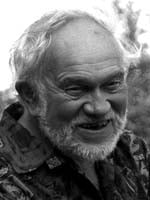Hubbard is dead, the old plumber: who will mend our burst pipes now, the tap that has dripped all the summer, testing the sink's overflow? No other like him. Young men with knowledge of new techniques and theories from books may better his work, straight from college, but who will challenge his squint-eyed looks in kitchen, bathroom, under floorboards, rules of thumb which were often wrong; seek as erringly stopcocks in cupboards, or make a job last half as long? He was a man who knew the ginnels alleyways, streets — the whole district: family secrets, minor annals, time-honoured fictions fused to fact. Seventy years of gossip muttered under his cap, his tufty thatch, so that his talk was slow and clotted, hard to follow, and too much. As though nothing fell, none vanished, and time were the maze of Cheetham Hill, in which the dead — with jobs unfinished waited to hear him ring the bell. For much he never got round to doing, but meant to, when weather bucked up, or worsened, or when his pipe was drawing, or when he'd finished this cup. I thought time, he forgot so often, had forgotten him; but here's Death's pomp over his house, and by the coffin the son who will inherit his blowlamp, tools, workshop, cart, and cornet (pride of Cheetham Prize Brass Band), and there's his mourning widow, Janet, stood at the gate he'd promised to mend. Soon he will make his final journey: shaved and silent, strangely trim, with never a pause to talk to any- body: how arrow-like, for him! In St Mark's Church, whose dismal tower he pointed and painted when a lad, they will sing his praises amidst flowers while, somewhere, a cellar starts to flood, and the housewife banging his front-door knocker is not surprised to find him gone, and runs for Thwaite, who's a better worker, and sticks at a job until it's done.
Credit
Copyright © 1957 by Tony Connor. Appears courtesy of the author.
Date Published
01/01/1957

